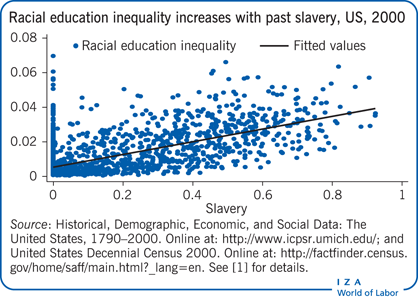Elevator pitch
Income inequality is a critical issue in both political and public debate. Educational attainment is a key causal factor of continuing inequality, since it influences human capital accumulation and, as a consequence, the unequal distribution of earnings. Educational inequality displays a racial dimension that is particularly persistent and difficult to eradicate through policy measures. Its roots lie in the colonial institution of slave labor, which was widespread in the US and Latin America up until the 19th century. However, the influence of slavery differs significantly across countries and between regions.
Key findings
Pros
There is empirical evidence that shows a negative relationship between slavery and current educational outcomes.
Racial education inequality has been closing over time but is still persistent.
Racial education inequality can be traced to the legacy of colonial slavery.
Colonial slavery affects current income inequality and its racial component via the channel of education.
Cons
Evidence on the relationship between slavery and current educational outcomes is rich for the US but less so for other regions.
Latin America is characterized by persistent income and educational inequalities, but country experiences differ with respect to historical slavery.
Slavery can be associated with a lower level of education; but evidence on its differential effect across races is scarce.
The influence of additional institutional factors (development of mass education and a more assimilationist approach to the integration of former slaves) can limit the effect of slavery on inequality.
